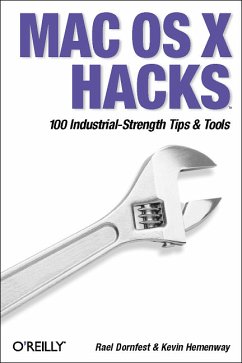Mac OS X is a marvelous confluence of the user-friendly and highly customizable Macintosh of yesteryear and the power and flexibility of Unix under the hood. Those coming to Mac OS X from previous incarnations of the operating system recognize much of the friendly face of the Macintosh but they are also plunged into a whole new world. Unix converts to Mac OS X find a familiar FreeBSD-like operating system at the core and many of the command-line applications that they're familiar with.
This presents a unique opportunity for combining traditional Unix hacking and Mac OS know-how. Mac OS X Hacks goes beyond the peculiar mix of man pages and not-particularly-helpful Help Center, pulling the best tips, tricks, and tools from the Mac power users and Unix hackers themselves.
The collection reflects the real-world know how and experience of those well steeped in Unix history and expertise, sharing their no-nonsense, sometimes quick-and-dirty solutions to administering and taking full advantage of everything a Unix desktop has to offer: Web, Mail, and FTP serving, security services, SSH, Perl and shell scripting, compiling, configuring, scheduling, networking, and hacking. Add to that the experience of die-hard Macintosh users, customizing and modifying their hardware and software to meet their needs: System Preferences, GUI mods and tweaks, hardware tips, vital shareware and freeware, AppleScript, AppleTalk and equivalents, keyboard modifiers, and general Macintosh-style tomfoolery.
Each Hack can be read easily in a few minutes, saving countless hours of searching for the right answer. Mac OS X Hacks provides direct, hands-on solutions that can be applied to the challenges facing both those meeting the Mac for the first time and long-time users delving into Mac OS X and its Unix underpinnings.
Mac OS X Hacks is the third in O'Reilly's new Hacks Serier which aims to begin reclaiming the term "hacking" for the good guys. In recent years, the term has come to be associated with those nefarious black hats who break into computers to snoop, steal information or disrupt Internet traffic. But the term originally had a more benign meaning, and you'll still hear it used this way whenever developers get together. Our new Hacks books are written in the spirit of the true hackers -- the people who drive innovation.
This presents a unique opportunity for combining traditional Unix hacking and Mac OS know-how. Mac OS X Hacks goes beyond the peculiar mix of man pages and not-particularly-helpful Help Center, pulling the best tips, tricks, and tools from the Mac power users and Unix hackers themselves.
The collection reflects the real-world know how and experience of those well steeped in Unix history and expertise, sharing their no-nonsense, sometimes quick-and-dirty solutions to administering and taking full advantage of everything a Unix desktop has to offer: Web, Mail, and FTP serving, security services, SSH, Perl and shell scripting, compiling, configuring, scheduling, networking, and hacking. Add to that the experience of die-hard Macintosh users, customizing and modifying their hardware and software to meet their needs: System Preferences, GUI mods and tweaks, hardware tips, vital shareware and freeware, AppleScript, AppleTalk and equivalents, keyboard modifiers, and general Macintosh-style tomfoolery.
Each Hack can be read easily in a few minutes, saving countless hours of searching for the right answer. Mac OS X Hacks provides direct, hands-on solutions that can be applied to the challenges facing both those meeting the Mac for the first time and long-time users delving into Mac OS X and its Unix underpinnings.
Mac OS X Hacks is the third in O'Reilly's new Hacks Serier which aims to begin reclaiming the term "hacking" for the good guys. In recent years, the term has come to be associated with those nefarious black hats who break into computers to snoop, steal information or disrupt Internet traffic. But the term originally had a more benign meaning, and you'll still hear it used this way whenever developers get together. Our new Hacks books are written in the spirit of the true hackers -- the people who drive innovation.

